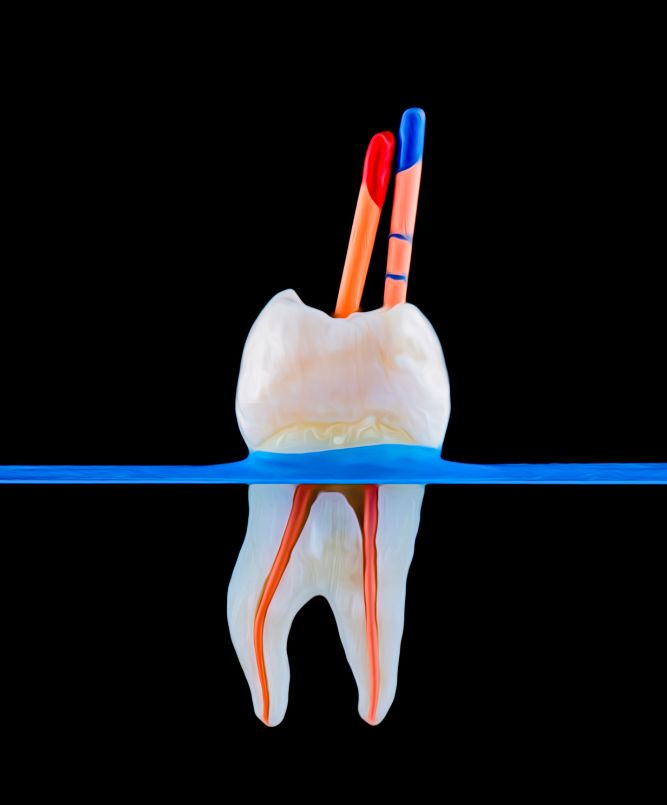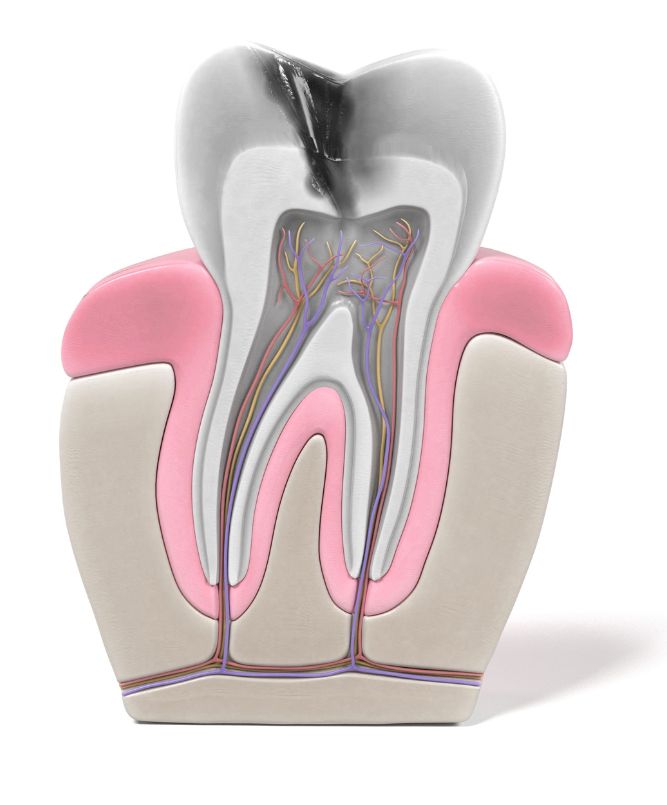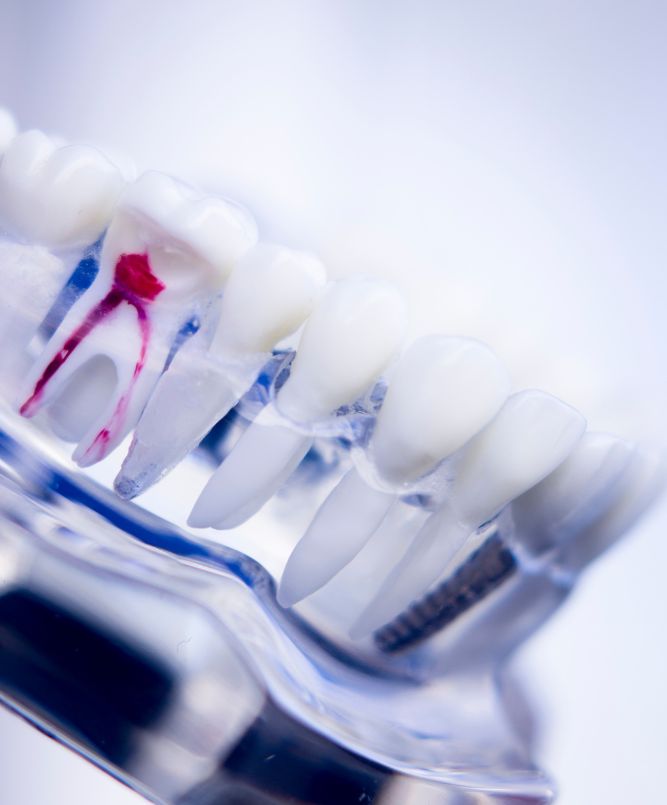The mere mention of the term, “root canal” makes most of us go crazy with fear. But root canal therapy is a common dental procedure to save an abscessed tooth.
Frequently Asked Questions
Root canal therapy is a dental procedure that repairs a badly decayed tooth. Usually employed in the case of pulp infection, root canal treatment may also be necessary in the case of inflamed pulp, in danger of getting infected. Although feared by many people, this procedure is not painful (since it is performed under local anesthesia) and provides instant relief from acute toothaches.
Infected or inflamed pulp is the result of tooth decay. Therefore, the dark hole in the tooth is the first hint that you may need a root canal therapy. Unfortunately, some cavities form in hardly visible places, so there are chances you may miss them. It is why dental checks are recommended at least once a year.
Another sign of an infected pulp is prolonged tooth sensitivity when exposed to cold, hot, or sweet foods and drinks. The pain refuses to go away when the external stimuli are removed. A bad taste in the mouth and bad breath accompany the pain, which increases with time. In the last stages, the toothache becomes unbearable, and painkillers are the only ones that can alleviate your suffering. If left untreated, a decayed tooth can develop an abscess (infection at the root of the tooth).
The Root Canal Procedure
The root canal therapy starts with an X-ray of the affected tooth to see the canal’s shape and disposal and determine if there is an abscess at the tooth’s root. A local anesthetic is injected into the gum to numb the area. In some cases, the nerves are already dead, so you should not experience any pain. The anesthetic is done anyway so that you can relax and collaborate perfectly with the dentist. Once the area is numb, the affected tooth is isolated with a rubber dam. Using a special drill, the dentist makes a hole in the tooth and performs a pulpectomy (extracts the inflamed or infected pulp, the dead nerves, the bacteria accumulated, and all the other debris trapped inside the root canals). The roots are afterward cleaned thoroughly, sterilized, and filled with a biocompatible material (usually gutta-percha). Cement is used to seal the gutta-percha, and a temporary filling is used to fill the cavity.


In the following visit, the dentist will thoroughly clean the tooth decay and apply a permanent filling or a crown, depending on the tooth’s health.
Abscess
If you have an abscess, the dentist will drain out the puss and will apply the medication in the root canals to kill any bacteria. The gutta-percha will be applied only after there is no risk of further infection.
Benefits of a root canal treatment
✓Preserves the natural tooth
✓Improves chewing
✓Preserves a good appearance
✓Ensures a normal biting force distribution
✓Prevents excessive wear on nearby teeth
✓Prevents bone loss around the affected root
The root canal therapy saves the natural tooth and prevents an infection spread in the jaw, skin, neck, or head. The procedure is painless and can be completed in one to three sessions, depending on the tooth’s status and availability. Get over the fear of the dentist and ask for dental help from us today! Schedule an appointment and we assure you the best and most painless root canal treatment.

Root Canal Therapy in Jersey City & North Bergen
The mere mention of the term, “root canal” makes most of us go crazy with fear. But root canal therapy is a common dental procedure to save an abscessed tooth.
What is root canal treatment?
Root canal treatment is a dental procedure that repairs a badly decayed tooth. Usually employed in the case of pulp infection, root canal treatment may also be necessary in the case of inflamed pulp, in danger of getting infected. Although feared by many people, this procedure is not painful (since it is performed under local anesthesia) and provides instant relief from acute toothaches.
Signs that you need a Root Canal Treatment
Infected or inflamed pulp is the result of tooth decay. Therefore, the dark hole in the tooth is the first hint that you may need a root canal. Unfortunately, some cavities form in hardly visible places, so there are chances you may miss them. It is why dental checks are recommended at least once a year.
Another sign of an infected pulp is prolonged tooth sensitivity when exposed to cold, hot, or sweet foods and drinks. The pain refuses to go away when the external stimuli are removed. A bad taste in the mouth and bad breath accompany the pain, which increases with time. In the last stages, the toothache becomes unbearable, and painkillers are the only ones that can alleviate your suffering. If left untreated, a decayed tooth can develop an abscess (infection at the root of the tooth).
The Root Canal Procedure
The root canal treatment starts with an X-ray of the affected tooth to see the canal’s shape and disposal and determine if there is an abscess at the tooth’s root. A local anesthetic is injected into the gum to numb the area. In some cases, the nerves are already dead, so you should not experience any pain. The anesthetic is done anyway so that you can relax and collaborate perfectly with the dentist.
Once the area is numb, the affected tooth is isolated with a rubber dam. Using a special drill, the dentist makes a hole in the tooth and performs a pulpectomy (extracts the inflamed or infected pulp, the dead nerves, the bacteria accumulated, and all the other debris trapped inside the root canals). The roots are afterward cleaned thoroughly, sterilized, and filled with a biocompatible material (usually gutta-percha). Cement is used to seal the gutta-percha, and a temporary filling is used to fill the cavity. In the following visit, the dentist will thoroughly clean the tooth decay and apply a permanent filling or a crown, depending on the tooth’s health.
Abscess
If you have an abscess, the dentist will drain out the puss and will apply the medication in the root canals to kill any bacteria. The gutta-percha will be applied only after there is no risk of further infection.
Benefits of a root canal treatment
- Preserves the natural tooth
- Improves chewing
- Preserves a good appearance
- Ensures a normal biting force distribution
- Prevents excessive wear on nearby teeth
- Prevents bone loss around the affected root.
The root canal treatment saves the natural tooth and prevents an infection spread in the jaw, skin, neck, or head. The procedure is painless and can be completed in one to three sessions, depending on the tooth’s status and availability. Get over the fear of the dentist and ask for dental help from us today! Schedule an appointment and we assure you the best and most painless root canal treatment.

